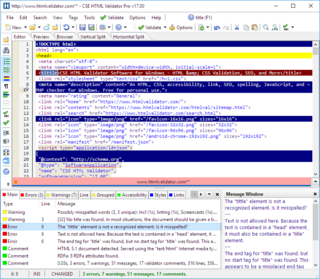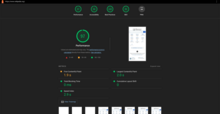Search engine optimization (SEO) is the process of improving the quality and quantity of website traffic to a website or a web page from search engines. SEO targets unpaid traffic rather than direct traffic or paid traffic. Unpaid traffic may originate from different kinds of searches, including image search, video search, academic search, news search, and industry-specific vertical search engines.
Relative to some web resource, a backlink is a link from some other website to that web resource. A web resource may be a website, web page, or web directory.
Search engine marketing (SEM) is a form of Internet marketing that involves the promotion of websites by increasing their visibility in search engine results pages (SERPs) primarily through paid advertising. SEM may incorporate search engine optimization (SEO), which adjusts or rewrites website content and site architecture to achieve a higher ranking in search engine results pages to enhance pay per click (PPC) listings and increase the Call to action (CTA) on the website.
Web analytics is the measurement, collection, analysis, and reporting of web data to understand and optimize web usage. Web analytics is not just a process for measuring web traffic but can be used as a tool for business and market research and assess and improve website effectiveness. Web analytics applications can also help companies measure the results of traditional print or broadcast advertising campaigns. It can be used to estimate how traffic to a website changes after launching a new advertising campaign. Web analytics provides information about the number of visitors to a website and the number of page views, or creates user behavior profiles. It helps gauge traffic and popularity trends, which is useful for market research.

Google Analytics is a web analytics service offered by Google that tracks and reports website traffic and also mobile app traffic & events, currently as a platform inside the Google Marketing Platform brand. Google launched the service in November 2005 after acquiring Urchin.

Progressive enhancement is a strategy in web design that puts emphasis on web content first, allowing everyone to access the basic content and functionality of a web page, whilst users with additional browser features or faster Internet access receive the enhanced version instead. This strategy speeds up loading and facilitates crawling by web search engines, as text on a page is loaded immediately through the HTML source code rather than having to wait for JavaScript to initiate and load the content subsequently, meaning content ready for consumption "out of the box" is served immediately, and not behind additional layers.
A search engine results page (SERP) is a webpage that is displayed by a search engine in response to a query by a user. The main component of a SERP is the listing of results that are returned by the search engine in response to a keyword query.
Google Developers is Google's site for software development tools and platforms, application programming interfaces (APIs), and technical resources. The site contains documentation on using Google developer tools and APIs—including discussion groups and blogs for developers using Google's developer products.
Google Search Console is a web service by Google which allows webmasters to check indexing status, search queries, crawling errors and optimize visibility of their websites.
Google Optimize, formerly Google Website Optimizer, was a freemium web analytics and testing tool by Google. It allowed running some experiments that are aimed to help online marketers and webmasters to increase visitor conversion rates and overall visitor satisfaction.

Web development tools allow web developers to test, modify and debug their websites. They are different from website builders and integrated development environments (IDEs) in that they do not assist in the direct creation of a webpage, rather they are tools used for testing the user interface of a website or web application.

CSS HTML Validator is an HTML editor and CSS editor for Windows that helps web developers create syntactically correct and accessible HTML/HTML5, XHTML, and CSS documents by locating errors, potential problems like browser compatibility issues, and common mistakes. It is also able to check links, check spelling, suggest improvements, alert developers to deprecated, obsolete, or proprietary tags, attributes, and CSS properties, and find issues that can affect search engine optimization.
Web performance refers to the speed in which web pages are downloaded and displayed on the user's web browser. Web performance optimization (WPO), or website optimization is the field of knowledge about increasing web performance.
Hummingbird is the codename given to a significant algorithm change in Google Search in 2013. Its name was derived from the speed and accuracy of the hummingbird. The change was announced on September 26, 2013, having already been in use for a month. "Hummingbird" places greater emphasis on natural language queries, considering context and meaning over individual keywords. It also looks deeper at content on individual pages of a website, with improved ability to lead users directly to the most appropriate page rather than just a website's homepage.
Conductor, founded in 2006, started as a marketing services company. In 2010, it launched its cloud-based software platform called Conductor Searchlight, which supports search engine optimization (SEO) and content marketing. The platform also offers suggestions for optimizing digital marketing metrics and increasing revenue.
Google PageSpeed is a family of tools by Google, Inc. designed to help optimize website performance. It was introduced at a Developer Conference in 2010. There are four main components of PageSpeed family tools:

A progressive web application (PWA), or progressive web app, is a type of application software delivered through the web, built using common web technologies including HTML, CSS, JavaScript, and WebAssembly. It is intended to work on any platform with a standards-compliant browser, including desktop and mobile devices.

Yoast SEO is a search engine optimization (SEO) tool plug-in for WordPress.
Website audit is a full analysis of all the factors that affect a website's visibility in search engines. This standard method gives a complete insight into any website, overall traffic, and individual pages. Website audit is completed solely for marketing purposes. The goal is to detect weak points in campaigns that affect web performance.
Semrush Holdings, Inc. is an American public company that has a SaaS platform known as Semrush. The platform is used for keyword research, competitive analysis, site audits, backlink tracking, and comprehensive online visibility insights. The keyword research tool provides various data points on each keyword. The platform also collects information about online keywords gathered from Google and Bing search engines. It was released by Boston-based company Semrush Inc, founded by Oleg Shchegolev and Dmitri Melnikov.






